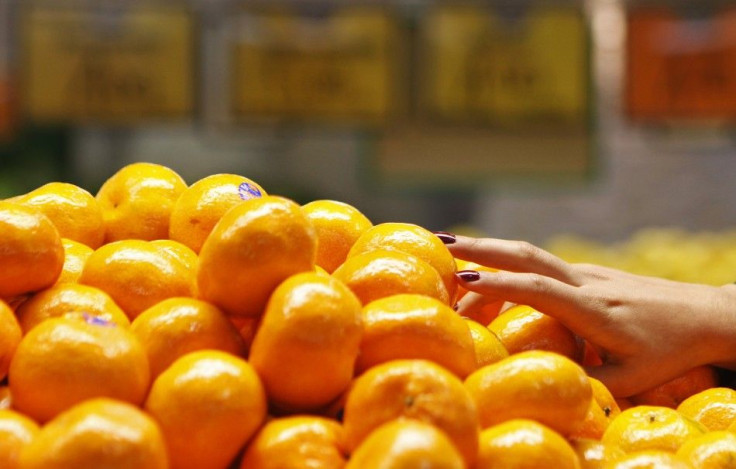FDA Won't Allow More Fungicide in Orange Juice

WASHINGTON/BRASILIA (Reuters) - The U.S. health regulator on Thursday declined a request by orange juice producers to allow a higher tolerance of a banned fungicide in juice imports, a decision that will force Brazil to stop exporting concentrated orange juice to the United States.
Brazil, the world's top orange juice producer, will still be able to ship its U.S. customers orange juice that is not from concentrate, since that variety contains much smaller levels of carbendazim.
Brazil asked the U.S. Food and Drug Administration (FDA) to give it until June 2013 to eradicate carbendazim from its juice after the regulator began checking all imports in January for the chemical which it banned in 2009.
Carbendazim is illegal on citrus in the United States, but commonly used in Brazil, the world's top orange juice exporter, to combat mold on orange trees. It is permitted up to a limit in imports to the European Union, the main buyer of Brazil's juice.
The checks began after Coca Cola alerted the FDA when it discovered the chemical in laboratory tests.
Orange juice futures have been on a rollercoaster ride since the FDA began testing orange juice imports amid uncertainty over whether the United States would cut off supplies from Brazil, which provides about a tenth of U.S. orange juice.
The futures, traded at New York's ICE exchange, hit an all-time high on January 23 of $2.244 a lb but the benchmark March contract had retreated to $1.8505 per lb by Thursday.
Brazil's juice industry has continued exports to the United States since, but only in diluted not-from-concentrate form which meets FDA requirements for carbendazim content below 10 parts per billion (ppb), a virtually undetectable quantity.
By the end of the year it is probable that things will be back to normal and we will be shipping concentrated juice to (the U.S.) again, an orange juice industry source told Reuters, declining to be named as he was not authorized to speak on the industry's behalf.
Brazil had requested the FDA distinguish between frozen concentrate and not-from-concentrate, meaning a 60 ppb carbendazim tolerance for the former since not-from-concentrate is diluted to about six times the volume of concentrate.
The FDA refused, saying its policy is to apply the 10 ppb limit on juice regardless of its concentration.
U.S. JUICE INDUSTRY TO BUY ELSEWHERE
The Juice Products Association of U.S.-based juice producers said in a statement it was disappointed by the FDA decision, since the Environmental Protection Agency declared carbendazim levels of up to 80 ppb posed no threat to human health.
It said it would have to seek supplies of juice from other producing countries.
The United States cannot grow enough oranges to satisfy American consumer demand for orange juice and therefore juice processors must rely on orange juice concentrate from other countries to assure adequate supplies, it said.
The association had backed Brazil's call for imports of concentrate to be tested in the diluted form in which it is consumed.
In a 1,600 word statement, the FDA said it could not accept the requests Brazil's juice industry presented to it in writing on January 19, citing laws that it said prohibited it from making exceptions that would accommodate it.
We recognize that the use in Brazil of a pesticide not authorized in the U.S. and FDA's detention of shipments bearing illegal residues has affected the orange juice market and has economic impacts, the response read.
However these impacts do not warrant a change in FDA's enforcement ..., it concluded, adding that making an exception would create an unfair advantage over other food producers who have incurred costs to ensure their products meet FDA standards.
The FDA statement can be viewed at: here
About two-thirds of Brazil's juice shipments to the United States are already in not-from-concentrate, ready-to-drink form.
The Brazilian industry source said exporters would have to review supply contracts for concentrated juice with U.S.-based importers to switch to a not-from-concentrate product which is more expensive and bulkier to ship.
The European Union, where more than two thirds of Brazil's orange juice is shipped, applies a carbendazim tolerance of 200 ppb.
(Additional reporting by Chuck Abbott; Editing by David Gregorio)
© Copyright Thomson Reuters 2024. All rights reserved.






















